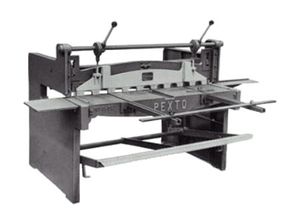Difference between revisions of "Sheet Metal Shear"
(→Safety) |
|||
| Line 27: | Line 27: | ||
==Description== | ==Description== | ||
| − | + | The shear is used for making straight cuts in sheet metal as well as other materials. The shearing blade is powered by applying force to the foot bar located in front of the machine. To prevent damage to yourself and or the machine make sure you obey the following rules: | |
| + | 1. Maximum aluminum material thickness you can cut with this machine is .07" x full width. | ||
| + | 2. Maximum mild steel thickness you can cut with this machine is .06" x 12" wide | ||
| + | 3. Maximum stainless steel thickness you can cut with this machine is .04" x 12" (ask before cutting stainless steel) | ||
| + | 4. NEVER attempt to cut round stock or wire on the shear. | ||
| + | 5. Plastics can be cut up to 1/8" thick x the blade width. | ||
| + | 6. Ask Justin or Nick G. prior to cutting any other materials. | ||
| + | 7. Always use the cam lock bar to hold material prior to cutting. | ||
Here is an example of this piece of equipment being used. | Here is an example of this piece of equipment being used. | ||
Revision as of 13:28, 5 February 2020
Make: Peck, Stow & Wilcox Co.
Model: G-52
Ace: Needed (Makerhub@georgefox.edu).
Location: Machine Shop
Description
The shear is used for making straight cuts in sheet metal as well as other materials. The shearing blade is powered by applying force to the foot bar located in front of the machine. To prevent damage to yourself and or the machine make sure you obey the following rules: 1. Maximum aluminum material thickness you can cut with this machine is .07" x full width. 2. Maximum mild steel thickness you can cut with this machine is .06" x 12" wide 3. Maximum stainless steel thickness you can cut with this machine is .04" x 12" (ask before cutting stainless steel) 4. NEVER attempt to cut round stock or wire on the shear. 5. Plastics can be cut up to 1/8" thick x the blade width. 6. Ask Justin or Nick G. prior to cutting any other materials. 7. Always use the cam lock bar to hold material prior to cutting.
Here is an example of this piece of equipment being used.
Insert video media here.
Documentation
Terminology
Insert terminology here
User Manual
Training
Overview
Insert Text
Demonstration
Insert text
General Procedure
Insert text
Safety
Fingers must be kept away from the blade at all times. Never place your hand or fingers near the blade.
Certification
Foxtale Quiz
Troubleshooting
Maintenance
General maintenance
Insert text
Specific Maintenance Tasks
| Maintenance Procedure | Frequency | Done By |
|---|---|---|
| Sample | Sample | Sample |
The shear in the shop is the Pexto G-52 Foot Squaring Shear. Squaring shears, like the one shown to the right, are used to cut sheet metal to a usable size by applying a shearing force with two opposing blades. This shear is foot operated and can cut stock that is a maximum of 52 inches in width and 16-gauge in thickness.
The current Ace of the Sheet Metal Shear is Needed (Makerhub@georgefox.edu).
Resources
Training
Shearing Steps
- Make sure the table and floor are clear prior to shearing.
- Mark your piece, place it on the right side of the table, and slide your piece in till your cut line is directly under the blade and against the side guard. Make sure your fingers stay out of the clampdown or you can accidentally crush your fingers if not careful.
- With your fingers holding the piece, use the yellow handle to clamp down on your piece. If the piece is extremely long, ask for assistance.
- Press down on the pedal with your foot until the shear completely cuts your piece. (You may need to use a lot of force) Before the blade engages the piece, make sure that your piece if held securely by the clampdown.
- Collect all of your pieces and deburr.
3 commandments
Stuff about the 3 commandments.
Safety First
- Never ever put your fingers in the path of the blade or under the clampdown unless you want your fingers cut off!!
- Don't put your second foot under the pedal as you could smash your toes.
- Never leave anything on the table of the shear.
- After shearing, use caution in handling your pieces as they are most likely sharp. Make sure you deburr.
